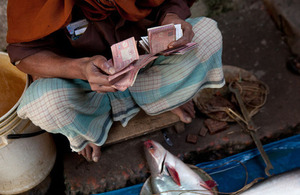DFID Research: Taxation and livelihoods in focus
In a new working paper the Secure Livelihoods Research Consortium and the International Centre for Tax and Development review the evidence from fragile and conflict-affected rural areas

Counting money at a fish market in Khulna, Bangladesh. Picture: Mike Lusmore/ WorldFish
Despite growing interest in the connections between taxation, development and governance, surprisingly little attention has been paid to the relationship between taxation and people’s livelihoods, particularly in places affected by war and violent conflict. Yet, it is in these landscapes that people encounter particularly fierce challenges to livelihood recovery, often finding themselves operating in a political economy environment that is at once complex and shifting, as well as brutal and exploitative.
This month, the Secure Livelihoods Research Consortium (SLRC), in collaboration with the International Centre for Tax and Development (ICTD), explores the evidence on taxation and livelihoods in conflict-affected situations. They conclude that understanding what people have to pay to get by is key to creating resilient livelihoods in conflict affected situations, and at present informal taxation has been a largely neglected research agenda.
The working paper – Taxation and livelihoods: A review of the evidence from fragile and conflict affected rural areas – maps out the evidence base and argues that if we are truly interested in the relationships between taxation and livelihoods in conflict affected situations, then an exclusive focus on formal taxation is inadequate.
In a recent blog post, Informal taxation and livelihoods: A neglected research agenda, the director of SLRC, Paul Harvey, tackles taxation ‘myths’ and explains why informal and formal taxation plays an important role in people’s everyday struggle to secure their livelihoods. Over the next year, SLRC and ICTD will be looking at the intersection of taxes and livelihoods, by focusing on 4 key themes:
- The full extent of formal and informal taxation incurred by individuals, households and small businesses.
- The positive material impacts of formal and informal taxation. That is, where paying taxes results in a benefit, whether it be formal and legal (such as receiving health care) or informal and unofficial (for instance, getting onto a food aid list).
- The relationship between taxation and livelihood choices and behaviours. How does the extent and nature of taxation affect what people do in order to make a living? For example, do people in eastern DRC give up palm oil production because it’s too heavily taxed to be worthwhile?
- The relationship between taxation and governance. Does the way people are taxed (formally and informally, corruptly and legally) affect their views of the legitimacy of the state?
The Department for International Development provides core funding to both SLRC and ICTD.
SLRC aims to provide a stronger evidence base about how people make a living, educate their children, deal with illness and access other basic services in conflict affected situations (CAS). It works towards providing better access to basic services, social protection and support to livelihoods matters for the human welfare of people affected by conflict, the achievement of development targets, such as the MDGs, and international efforts at peace and state building.
ICTD generates knowledge that will help developing (particularly low income and fragile) countries both to mobilise domestic resources efficiently, effectively and equitably and to develop tax systems that promote pro-poor economic growth and good governance.